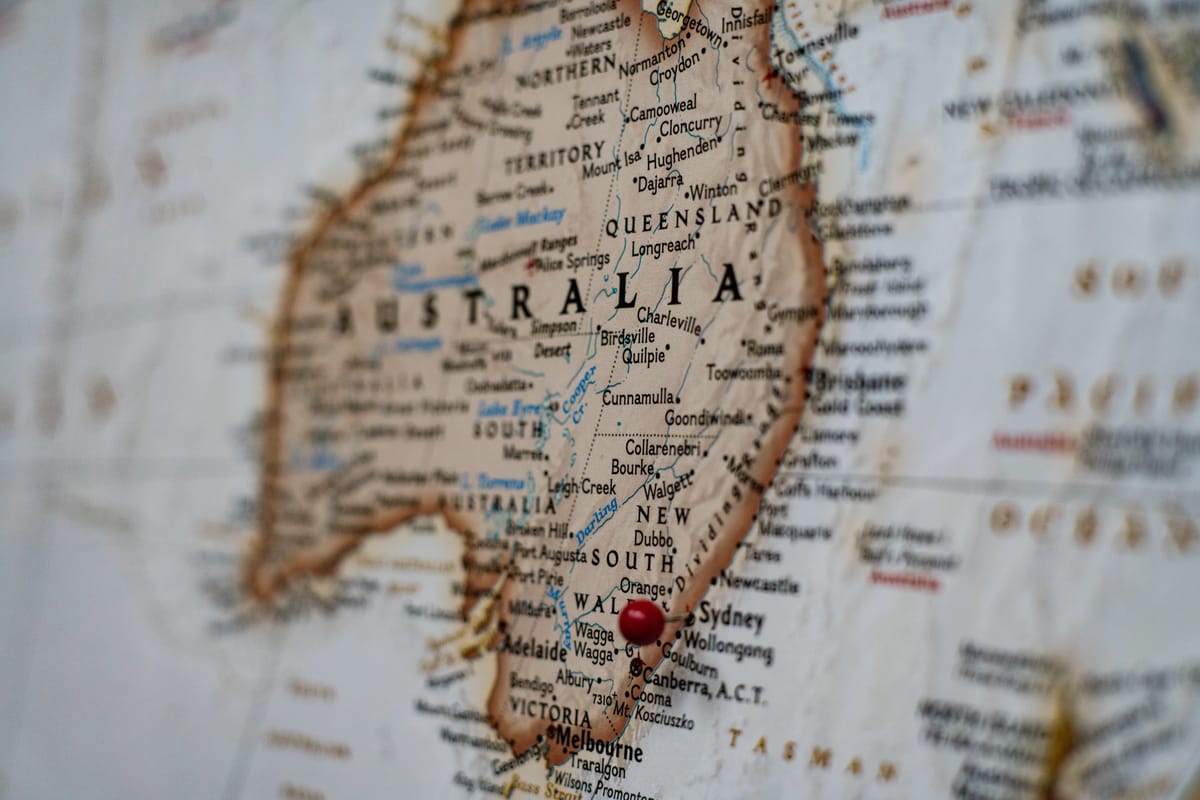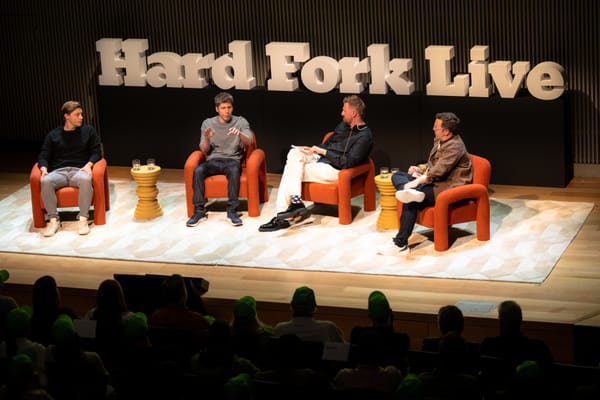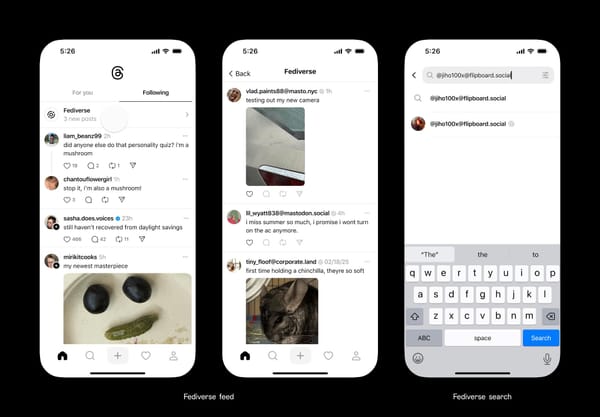Facebook calls Australia's bluff
But Google gives in. What's next?

Yesterday, I wrote that Australia’s News Media Bargaining Code threatened to splinter the internet. On Wednesday morning, the splintering arrived: Google cut a deal with News Corp. that will ensure its services continue to be provided in Australia, and Facebook walked away from the bargaining table and began preventing people from sharing news links from Australian publishers around the world.
I think Facebook basically did the right thing, and Google basically did the wrong thing, even though Google had a much tougher call to make. Today, let’s talk about why the tech giants made the decisions that they did, why Australia’s shakedown is rotten, and what’s likely to happen next. (If you didn’t read my piece on the subject yesterday, it offers a lot of useful context for what follows. I’ve made it free for all subscribers to read.)
In development for three years, the bargaining code is intended to give Australia’s heavily concentrated media industry more leverage as publishers seek direct payment from Google and Facebook for the right to display links to their work. It does this by forcing the platforms into binding arbitration with publishers who bring cases, and puts the decision for how much the platform has to pay the publishers into the hands of the arbiter. Each side throws out a number, and the arbiter picks the one they think is most fair.
(The arbiter does not pick a number in between, by the way; I got that wrong yesterday and have corrected the post.)
By design, the arbitration process favors the publisher. Also by design, it encourages platforms to avoid the process altogether by signing one-off deals with individual publishers in hopes that they can get better terms that way.
I. Google
Over the past few days, Google has been signing deals with the biggest publishers in Australia for exactly this reason. Seven West Media got a deal, Nine Entertainment got a deal, and on Wednesday, one of the country’s biggest conglomerates — Rupert Murdoch’s News Corp. — got its deal. In exchange for an undisclosed sum, Google will feature News Corp. articles in its News Showcase product in Australia and beyond.
“Among the News Corp publications joining Google News Showcase will be the Wall Street Journal, Barron’s, MarketWatch, and the New York Post; in the UK: the Times and the Sunday Times; and the Sun; and in Australia a range of news platforms, including the Australian, news.com.au, Sky News, and multiple metropolitan and local titles,” the company told me in a statement.
As announced, the deals pertain to Google News Showcase, a tab within Google News that contains licensed content from official partners. But the people I’ve spoken with are operating under the assumption that if there’s a deal between Google and a big publisher in Australia, that publisher either can’t or won’t be dragged to arbitration for showing links and snippets of text in search results.
Search, of course, is what Google cares about the most, and explains why the company caved. Removing links to news stories from Google would break the search engine in Australia, opening it up to rivals. And so the company signed a bunch of deals under duress.
(It’s worth mentioning that any Australian publisher aggrieved by an unfair exchange of value with Google here could opt out of search results at any time by adding one line of HTML to their website. But almost none of them do, because traffic from Google drives significant advertising and subscription revenue to them.)
With its moves today, Google has now invited every other country to pursue a similar protection racket. Parliament members in Canada and the European Union have already endorsed measures similar to Australia’s. And a basic tenet of the open web — that hyperlinks can be freely displayed on any website — just took a body blow.
I’d feel better about this if publishers said a single word about how much of their new Google revenue that they planned to spend on journalists’ salaries, or news gathering.
They didn’t, though, and why would they? Australia’s bargaining code doesn’t say one word about requiring that any of this money be spent on journalism, either.
II. Facebook
Unlike Google, Facebook’s core service doesn’t rely heavily on news articles. The company estimates that only about 4 percent of posts on the network are works of journalism. It is not all that hard to imagine opening up Facebook and scrolling for a few minutes, never to see a link to a news article at all — and in fact, millions of people do this every day.
And so it is perhaps less surprising that when Google blinked at Australia’s demand, Facebook walked away. Here’s William Easton, Facebook’s managing director for Australia and New Zealand:
While the government has made some changes, the proposed law fundamentally fails to understand how our services work.
Unfortunately, this means people and news organisations in Australia are now restricted from posting news links and sharing or viewing Australian and international news content on Facebook. Globally, posting and sharing news links from Australian publishers is also restricted. To do this, we are using a combination of technologies to restrict news content and we will have processes to review any content that was inadvertently removed.
And just like that, news articles originating in Australia disappeared from Facebook.
Easton says that in the past year, Facebook sent more than 5 billion clicks to Australian publishers, whose value he estimated at AU$ 407 million. If the current situation holds, Facebook will send those same publishers zero clicks — a move that, I imagine, may force publishers to recalibrate in their minds the relative value that Facebook and publishers provide one another.
Of course, many critics were apoplectic that Facebook had taken this move, calling it a vile act of censorship, unchecked greed, and destruction of the public sphere.
Certainly the execution of the ban left something to be desired.
Rather than building a blacklist of news sites to restrict, Facebook tried using its machine learning systems to identify news publishers, and the systems went predictably haywire. There were reports that government and emergency pages, nonprofit groups, and the Bureau of Meteorology could no longer share. Given how long the possibility of restricting links has loomed, you’d think Facebook would have better prepared for it to arrive.
And while I don’t want to make light of these mistakes, to the extent that they teach Facebook’s user base to seek their news elsewhere, they can serve a noble purpose. I don’t know a single journalist who feels comfortable with social networks being anyone’s primary source of news, particularly after years of daily reporting on the misinformation and conspiracy theories that so often thrive on them. And so it is more than a little strange to see so many people insisting that Facebook is obligated to share publishers’ content, on whatever terms those publishers set.
Some, like OneZero’s Will Oremus, have noted that removing high-quality news sources from Facebook will likely mean a boost for lower-quality blog posts, memes, and other junk. That seems fair, and I do think it bears watching. But what if, in the meantime, Australians simply … visit websites? Subscribe to newsletters? Read … books? I realize I sound hopelessly naive here. But if this is the beginning of more people coming to understand the value in visiting trusted news sources directly, I think we’d all be better off. Publishers included!
In reality, though, I suspect the great Australian news outage of 2021 will be short lived. Australia’s treasurer, a leading figure in the negotiations, said he spoke with Mark Zuckerberg today, and that negotiations continue. (Fun fact from the New York Times: Australia’s treasurer was also “the best man at the wedding of Ryan Stokes, who is a son of Kerry Stokes, the billionaire owner of Seven West Media, one of the companies that have reached a deal with Google.”)
“We will continue to engage with the government on amendments to the law, with the aim of achieving a stable, fair path for both Facebook and publishers,” Facebook told me today when I asked for an update.
In the meantime, though, I’m glad Facebook called publishers’ bluff.
III. What’s next
I wish Australia would take Facebook’s rejection as a sign it should rethink its approach to media regulation entirely. It could just tax companies based on their revenues, for example. It could earmark those revenues to support journalism — nonprofit public media, even, which has consistently been shown to have powerful civic benefits. Or it could pursue a bargaining code that requires big media conglomerates to create and support jobs in journalism, rather than simply accept tens of millions of dollars and spend them however they like — or just return it to shareholders.
In reality, though, none of that seems likely to happen. Google’s capitulation means that Australian crony capitalism is now likely to be exported worldwide. Legacy media outlets will become richer — and also more dependent on the tech giants that they excoriate daily for having too much power over them. All the while, the media industry will continue to consolidate, and it will be harder to get or keep a job in journalism.
A bargaining code that truly sought to level the playing field between the platforms and the public would take these realities into account. There is still time to amend it before Parliament takes a vote, and here’s hoping that lawmakers do — both in Australia and beyond it.
Message received
Y’all really, really prefer the standard linking format. So we’re back to normal today — though I still feel like I could make these feel more valuable somehow; maybe just arranging them differently. I’ll keep you posted, but thanks to everyone who wrote in yesterday with feedback!
The Ratio
Today in news that could affect public perception of the big tech companies. See if you can spot today’s theme!
⬇️ Trending down: New York sued Amazon, alleging that the company took insufficient measures to protect warehouse workers from COVID-19. The state’s attorney general says Amazon “failed to properly clean its buildings, conducted inadequate contact tracing for known Covid-19 cases, and ‘took swift retaliatory action’ to silence complaints from workers.” (Karen Weise / New York Times)
⬇️ Trending down: Leaked documents reveal how Amazon gave preferential treatment to a small group of sellers on its platform in India, but misrepresented its ties publicly to avoid regulations. Small businesses in India have long complained about predatory pricing practices from Amazon, which these documents would seem to support. (Aditya Kalra / Reuters)
⬇️ Trending down: A consumer group found fake Amazon reviews being sold in bulk online. Fake reviews is an issue that Amazon does not seem to be making much progress on lately. (BBC)
⬇️ Trending down: A review of Facebook data by The Markup’s Citizen Browser Project found that the company labeled false posts inconsistently, and gave special deference to posts from President Trump. Posts viewed by 330 users only included a label affirming something as “false” 12 times. (Jon Keegan, Colin Lecher, and Corin Faife / The Markup)
Governing
YouTube removed almost 3,000 accounts related to separate state influence operations from China and Russia. Google discovered the operations, which mostly posted spam but also dipped into politics. (Phil Muncaster / Infosecurity)
Epic Games expanded its fight against Apple to the European Union. The Fortnite developer filed a formal antitrust complaint there, as it has in the United States, the United Kingdom, and Australia. (Jon Porter / The Verge)
An argument that the Oversight Board should delay its opinion on whether Trump should return to Facebook until an investigation into the events leading up to January 6 can be completed. The authors, who represent the Knight First Amendment Institute, argue an independent commission should investigate how Facebook itself contributed to the Capitol attack. (Jameel Jaffer and Katy Glenn Bass / New York Times)
The US government’s antitrust cases against the tech giants have generated a rash of follow-on lawsuits from private citizens. More than 10 suits have been filed today from owners of small businesses who say they have been harmed by Google and Facebook. (David McCabe / New York Times)
Religion-themed misinformation about the COVID-19 vaccine is widespread on social networks. “Some churches and Christian ministries with large online followings — as well as Christian influencers on Facebook, Instagram, TikTok, Twitter and YouTube — are making false claims that vaccines contain fetal tissue or microchips, or are construing associations between vaccine ingredients and the devil.” (Elizabeth Dwoskin / Washington Post)
Authoritarian regimes could exploit cries of “deepfake!” for their own purposes. As discussions about the authenticity of videos posted to social networks proliferate, autocrats could gain more leverage to deny the reality of their crimes. (Sam Gregory /
TikTok faces new some extremely vague complaints from Europe’s consumer-protection watchdogs. The European Consumer Organization complains that the company is not making it clear enough how it is using data. (David Meyer / Fortune)
Industry
No, that was not Brad Pitt hosting a two-hour conversation on Clubhouse. Time for Clubhouse to get a verification strategy. I keep meaning to write this in a column, but the best verification strategy right now is actually Tinder’s! (Jesse Damiani / Forbes)
After a successful test in India, YouTube is bringing its Shorts product to the United States. The TikTok competitor is one of a number of new product features the company announced today, alongside 4K video and offline DVR storage for YouTube TV, and a redesign for YouTube VR. (Darrell Etherington / TechCrunch)
Twitter is testing voice memos in direct messages. India, Brazil and Japan are getting access first. (Babu Mohan / Android Central)
Twitter employee bonuses for 2020 will be lower after the company missed its internal revenue and profit goals. It’s an effect of advertising revenues declining during the pandemic. (Alex Heath / The Information)
TikTok’s ad business is rebounding strongly now that the threat of Trump’s ban has receded. The number of advertisers on the platform grew by 500 percent in 2020, the company said. (Sheila Dang / Reuters)
Amazon launched a Kickstarter-like program to let users vote on which products should be built. The twist is that Amazon builds all the products. (Todd Haselton / CNBC)
Reddit’s 2020 transparency report indicates that the platform’s biggest ongoing problem is spam. Of 85 million posts removed last year, “99.76% of these were spam or ‘content manipulation’ like brigading and astroturfing.” (Devin Coldewey / TechCrunch)
The field of artificial intelligence research faces increasing scrutiny over the ethnical applications of the technologies described. While a focus on ethics is common in other fields, it’s relatively new to computer science. (Matthew Hutson / New Yorker)
Those good tweets
Trying to live my life in a way that "Rest In Piss" doesn't start trending within 5 minutes of people learning about my death
— Barred and Boujee (@AudreLawdAMercy) 5:45 PM ∙ Feb 17, 2021
Sksksksk
— Melissa (@veganmylkshake) 12:26 AM ∙ Feb 14, 2021
What's the matter? You've barely touched your valentine's meat tray for 1
— sloth bear on a bike (@HeftyLeftie) 1:48 PM ∙ Feb 14, 2021
Talk to me
Send me tips, comments, questions, and your favorite Australian insults: casey@platformer.news.





